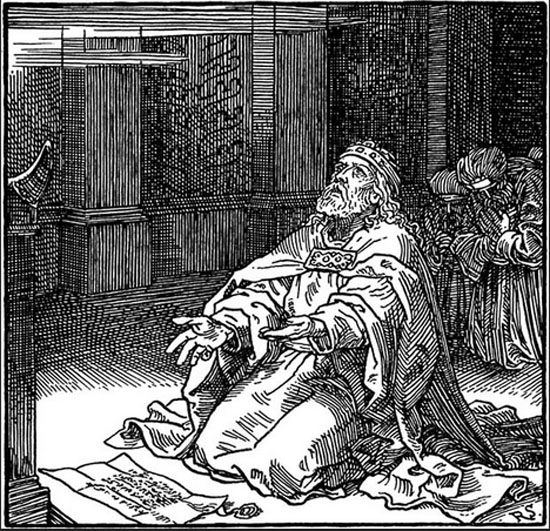This article was imported from our previous website, which many have broken some of the content. We apologize in advance for any strange formatting or broken links you may find.

“So now, O Lord our God, save us, please, from his hand, that all the kingdoms of the earth may know that you, O Lord, are God alone.”
– King Hezekiah, 712 B.C.
King Hezekiah was the 13th king of Judah and he ruled for 29 years on the throne. His reign was depicted as a successful one. “He did what was right in the eyes of the Lord, according to all that David his father had done” (2 Kings 18:3). “Thus Hezekiah did throughout all Judah, and he did what was good and right and faithful before the Lord his God. And every work that he undertook...prospered” (2 Chronicles 31:20, 21b). While most of the kings of Israel and Judah failed to walk in obedience and submission to God, Hezekiah was one of the rare exceptions, and his life and career reflected that.
As you travel through the streets of Jerusalem, there are many sights to see and experience. One of the most unique and entertaining locations is Hezekiah’s Tunnel, situated in the city of David. Hezekiah’s Tunnel is one of the ancient engineering wonders of the world, a winding tunnel that is almost six football fields in length. It was hewn into the bedrock and provided for water to flow from a spring to a pool. What makes this tunnel so amazing is that the workers started on opposite ends and made their way to the middle where they then connected the two tunnels into one. Archeologists and scholars are still not completely sure how they orchestrated the entire tunnel.
Tourists and others are allowed into the tunnel where water still flows. Wearing water shoes and a headlamp, I along with 60 others weaved our way through the S-shaped tunnel. At certain points the ceiling only reaches 4 feet and so you are forced to navigate your body through tight quarters. Turn off all the lights and you now must grope your way through. There are several blind alleys and false starts along the way and it makes for a fascinating experience and one that I won’t ever forget.
The history behind Hezekiah’s Tunnel is that in 712 B.C., King Sennacherib and his mighty Assyrian army showed up in Israel. After having conquered the Northern kingdom, he set his sights on Judah and its capital, Jerusalem. Like any good leader, Hezekiah sought to protect his kingdom and his people. He fortified the walls of the city, he stored up animals, grain, oil and wine inside. And he built a winding tunnel, which would keep the main water source from the enemy but also provide for the most basic of needs to the city. He was going to make sure that he could do everything in his power to prevent the enemy from conquering.
With his army some 30 miles southwest of Jerusalem, Sennacherib sent his envoys to the holy city and they announce to the King and the people that they have no hope of stopping the conquest. These servants of the Assyrian king mock God and denounce Hezekiah’s leadership and seek to demoralize the people. “Has my master sent me to speak these words to your master and to you…who are doomed with you to eat their own dung and to drink their own urine?" (2 Kings 18:27).
Hezekiah has done all that he can do; he is helpless before this mighty army and their leader who is hell-bent on their annihilation. It is in the moment of his greatest distress that he does the only thing he can do: “Then Hezekiah the king and Isaiah the prophet, the son of Amoz, prayed because of this and cried to heaven” (2 Chronicles 32:20). He throws himself before the One True God and prays for deliverance. “So now, O Lord our God, save us, please, from his hand” (2 Kings 19:19a).
God not only hears Hezekiah’s prayers, but he shows up and delivers in a miraculous way. While the Assyrian army slept through the night, the angel of the Lord showed up at their camp and put a butt-whooping on them. When arrogant King Sennacherib woke up in the morning he found 185,000 soldiers dead on the ground. The king, with tail between his legs, retreated from Judah and never returned.
There are so many parallels for us to pull from this story, but as I think about the people of God, I realize that each one of us has people in our lives that we are responsible for. Whether it's our family or our workplace or even a Life Group or team, we have a calling to love and care for others. This is not an easy task. It requires preparation, effort and dedication. There is great sacrifice and energy demanded on your part. And often it feels as if it’s not good enough, that all of your work only leads to apathetic people, repeat offenders, broken marriages, and willful rebellion.
We can in those moments be tempted to fear that our efforts are for naught, that all is lost, and that darkness has won. But may I implore us to have the attitude of Hezekiah, who in that moment, did not surrender to the forces of evil, but surrendered to the God of the universe, the Holy One that holds power over all the earth. He cried out to God, and God answered him in the most unlikely of ways. May we cry out to God and trust Him to save the ones we care so deeply about. “So the Lord saved Hezekiah and the inhabitants of Jerusalem from the hand of Sennacherib king of Assyria and from the hand of all his enemies, and he provided for them on every side” (2 Chronicles 32:23). Let it be so.